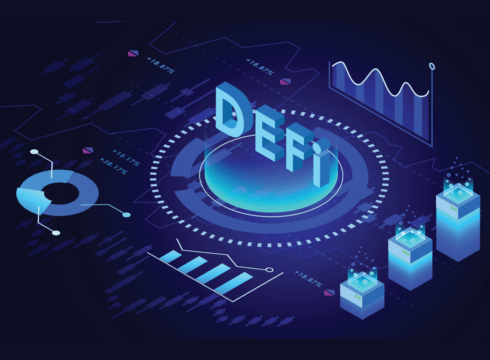DeFi and blockchain technology are reshaping the financial services industry
Unlike traditional banking, DeFi projects powered by blockchain technology do not require intermediaries to provide services such as buying, selling, lending, and borrowing crypto assets
As more people enter the digital asset space, DeFi and blockchain will expand their capabilities and become more robust in terms of scalability and security
Inc42 Daily Brief
Stay Ahead With Daily News & Analysis on India’s Tech & Startup Economy
Decentralised Finance (DeFi) is a new financial system that is emerging as an alternative to the traditional financial world. DeFi and blockchain technology are reshaping the financial services industry. Unlike traditional banking, DeFi projects powered by blockchain technology do not require intermediaries to provide services such as buying, selling, lending, and borrowing crypto assets. It helps omit all the charges levied at each stage by the middlemen.
Accessibility is the most significant change that blockchain-enabled DeFi projects can enable. People all over the world can borrow or lend money in cryptocurrency with a few clicks of a smartphone. Users can also gain more control over their assets with DeFi. Users can directly interact with the blockchain protocol to obtain financial services or execute trades by using decentralised exchanges.
Potential To Reinvent Finance
Let’s look at a scenario to see how DeFi and blockchain can revolutionise finance.
Suppose you wish to get a loan. What would you do? Most people would opt to go to a bank to get a loan. Let us now go over the steps involved in accomplishing this. The first step would be for a bank to conduct due diligence in determining your creditworthiness. For that, it would pull up all your financial records.
Later, you would need to explain why you need the loan and provide other information about your financial situation. These details would include bank statements, pay stubs, and other relevant documents. The bank would then require you to put up collateral in case you defaulted. If the bank finds you worthy enough to get the loan, it will take at least a few days for the sanctioning and disbursement.
Now consider how the same process would unfold if cryptocurrency and blockchain were used.
If you have some crypto, you can use it as collateral to borrow money from anywhere in the world in just a few clicks. The loan would be disbursed in a matter of seconds. This type of finance is known as decentralised finance.
Rise Of DeFi & Blockchain-Powered Fintech Services
DeFi can make lending and borrowing based on collateral much easier than traditional models. DeFi transcends the traditional financial system’s hegemony and has the potential to truly revolutionise modern finance.
You don’t even need to worry about security because blockchain technology uses automated cryptographic digital signatures to keep borrower and lender identities safe and secure.
Every day, millions of transactions are processed in the financial services industry, where transparency, security, and cost-efficiency are of the utmost importance. Every year, nearly 45% of financial intermediaries, such as money transfer and stock exchange services, are targeted by cyberattacks.
Blockchain technology is gaining popularity due to its inherent security and transparency. This technology has the potential to revolutionise financial services such as the stock market, banking, asset management, and insurance.
The insurance industry is one of the most significant DeFi and blockchain use cases. When we look at today’s insurance system, we see that it is plagued by complex paperwork, audit systems, and procedures. In such a case, using smart contracts powered by blockchain technology could significantly improve industry efficiency.
The rise in DeFi adoption has fueled the growth of DeFi-based prediction platforms, where users can trade value by accurately forecasting the outcomes of future events. Furthermore, all blockchain transactions are open to the public for verification and validation.
Payments can be scaled up faster, cheaper, and more efficiently by using digital currencies and distributed ledger technology. Even central banks are experimenting with blockchain because it has the potential to save time, money, and effort. It can also facilitate real-time gross settlement among central, commercial, and independent banks.
As KYC has become a required process in financial services, blockchain technology can assist banks in streamlining their KYC process. It has the potential to automate customer identification by providing a single digital source of ID and other information, allowing for the seamless exchange of documents between banks and other sources, reducing fraud and increasing real-time authentication.
The financial services industry is looking to blockchain and DeFi as more secure and efficient technology sources. As more people enter the digital asset space, DeFi and blockchain will expand their capabilities and become more robust in terms of scalability and security.
{{#name}}{{name}}{{/name}}{{^name}}-{{/name}}
{{#description}}{{description}}...{{/description}}{{^description}}-{{/description}}
Note: We at Inc42 take our ethics very seriously. More information about it can be found here.


